[April-2016-NEW]Microsoft 70-342 Practice Test 231q Free Download in Braindump2go
2016 April Microsoft 70-342 New Questions and Answers 231q Released By Braindump2go Today!
QUESTION
You have an Exchange Server organization that contains five servers.
The servers are configured as shown in the following table.

You deploy Microsoft Lync Server 2010.
You need to create a Lync Server SIP Unified Messaging (UM) dial plan to enable voice integration between Lync Server and Exchange Server.
Which three Exchange servers should you associate to the UM dial plans? (Each correct answer presents part of the solution. Choose three.)
A. Server1
B. Server2
C. Server3
D. Server4
E. Server5
Answer: ABE
Explanation:
A: You can enable Unified Messaging (UM) in Microsoft Exchange Server 2010.
You must enable the Exchange computer running the Unified Messaging server role before the Unified Messaging server can process calls for UM-enabled Exchange 2010 recipients in your Exchange organization.
However, the Unified Messaging server also must be added to a UM dial plan before it can process calls for Unified Messaging.
BE:
* Requirements and Recommendations
Client Access and Mailbox. In Microsoft Exchange Server 2013, Exchange UM runs as a service on these servers.
* Deploy the Exchange Mailbox server roles in each Exchange Unified Messaging (UM) forest where you want to enable users for Exchange UM.
Reference: Configuring Unified Messaging on Microsoft Exchange Server to Work with Lync Server 2013
QUESTION
You have an Exchange Server 2013 organization.
All user mailboxes have an In-Place Archive enabled.
You need to identify which email message types can be archived by using a retention policy. Which message type or types should you identify? (Each correct answer presents part of the solution. Choose all that apply.)
A. calendar items
B. mail items
C. note items
D. task items
E. contact items
Answer: ABCD
Explanation:
Retention policy tags can created for these Folders:
* Calendar
This default folder is used to store meetings and appointments.
* Inbox
This default folder is used to store messages delivered to a mailbox.
* Notes
This folder contains notes created by users in Outlook.
These notes are also visible in Outlook Web App.
* Tasks
This default folder is used to store tasks.
Etc.
: Retention tags and retention policies
http://technet.microsoft.com/en-us/library/dd297955%28v=exchg.150%29.aspx
QUESTION
You plan to deploy 20 Client Access servers that will have Exchange Server 2013 installed.
You need to prepare the certificate required for the planned deployment. The solution must ensure that the same certificate can be used on all of the Client Access servers.
What should you do first?
A. From the Exchange Admin Center, create a new certificate request.
B. On each Client Access server, start the Certificates console and run the Certificate Import Wizard.
C. On all of the Client Access servers, delete the default self-signed certificates.
D. On one of the Client Access servers, run the Remove-ExchangeCertificate cmdlet.
Answer: A
Explanation:
You can use the EAC to generate certificate requests that work with most certificate issuers.
Note:
To prevent clients from receiving errors regarding untrusted certificates, the certificate that’s used by your Exchange server must be issued by someone that the client trusts. Although most clients can be configured to trust any certificate or certificate issuer, it’s simpler to use a trusted third-party certificate on your Exchange server. This is because most clients already trust their root certificates. There are several third-party certificate issuers that offer certificates configured specifically for Exchange.
QUESTION
Your company has an Exchange Server 2013 organization named adatum.com.
You purchase an Office 365 subscription and configure a hybrid deployment.
All recipients have an email address that contains a SMTP suffix of adatum.com.
You discover that all of the email messages sent to the Internet from users who have Office 365 mailboxes are routed through the on-premises Exchange servers.
You need to ensure that all of the email messages are sent directly to the Internet.
What should you do?
A. Modify the Send connector.
B. Run the Hybrid Configuration wizard.
C. Create a new Sharing policy.
D. Modify an organization relationship.
Answer: B
Explanation:
Creating and configuring a hybrid deployment with the Hybrid Configuration wizard is now a single process in Microsoft Exchange Server 2013.
Note:
A hybrid deployment offers organizations the ability to extend the feature-rich experience and administrative control they have with their existing on-premises Microsoft Exchange organization to the cloud. A hybrid deployment provides the seamless look and feel of a single Exchange organization between an on-premises Exchange Server 2013 organization and Exchange Online in Microsoft Office 365. In addition, a hybrid deployment can serve as an intermediate step to moving completely to an Exchange Online organization.
QUESTION
You have an Exchange Server 2013 organization.
A user named User1 has a mailbox that is enabled for Unified Messaging (UM).
User1 has nine call answering rules.
When User1 attempts to create a new call answering rule, the user receives an error message.
You need to identify what prevents User1 from creating a call answering rule.
What should you identify?
A. The mailbox of User1 has the CallAnsweringRulesEnabled parameter set to $false
B. The UM mailbox policy of User1 has the AllowCallAnsweringRules parameter set to $false.
C. User1 exceeds the Inbox rules storage quota.
D. User1 has the maximum number of call answering rules allowed.
Answer: D
Explanation:
Call answering rules are created and configured by a voice mail-enabled user using Outlook or Outlook Web App. The rules are stored along with other voice settings in the user’s mailbox.
A total of nine call answering rules can be set up for each UM-enabled mailbox. These rules are independent of the Inbox rules that are set up by users, and don’t take up part of the Inbox rules storage quota for the user.
http://technet.microsoft.com/en-us/library/dd335138%28v=exchg.150%29.aspx
QUESTION
You have an Exchange Server 2007 organization.
You deploy a new Exchange Server 2013 organization.
You plan to move all of the mailboxes to the new organization by performing a cross-forest mailbox move.
You need to recommend a solution to meet the following requirements:
– Users must be able to reply successfully to email messages they received before their mailbox moved.
– Users must be able to send email messages to internal mailboxes by using the entries in the nickname cache that existed in Microsoft Outlook before their mailbox moved.
What should you recommend doing before moving the mailboxes?
A. Create a sharing policy and a remote domain.
B. Create an organization relationship and a remote domain.
C. For all of the users in the new organization, add their LegacyExchangeDN value as an x500
proxy address.
D. For all of the users in the new organization, add their LegacyExchangeDN value as an SMTP
proxy address.
Answer: C
Explanation:
Problem:
An email is sent and a NDR is generated to the sender showing an X500 address in the recipient field. The cause of this is that Exchange uses the X500 address to route mail internally and once the attributes have been removed from a user object (or a contact was removed) and a mailbox is created for the same user, Exchange creates a new X500 address (it is the same information as before, but the last three characters are randomized to keep them unique within the system).
Resolution:
The simpliest thing to do is add a new custom email address to the user object, paste the old LegacyExchangeDN in the address field, and set the type to X500.
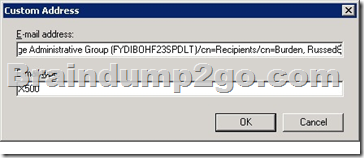
http://russburden.files.wordpress.com/2012/06/customx500.jpg?w=595
QUESTION
Drag and Drop Question
Your company has two offices. The offices are located in New York and San Francisco.
You have an Exchange Server 2013 organization that contains two servers. The servers are configured as shown in the following table.

The organization contains four mailbox databases.
The mailbox databases are configured as shown in the following table.
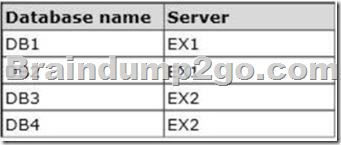
Recently, DB1 went offline because of a disk failure. The disk is restored and DB1 is mounted.
You discover that there are more than 10,000 email messages queued for delivery to DB1.
You need to preserve the messages and perform the following actions:
– Export the messages queued for delivery to a different drive.
– Clear the messages queued for delivery.
– Ensure that the messages queued for delivery to DB1 are delivered while preserving the original message header information.
– Prevent duplicate messages.
Which four actions should you perform in sequence? (To answer, move the appropriate four actions from the list of actions to the answer area and arrange them in the correct order.)
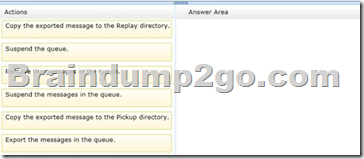
Answer:
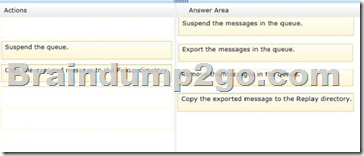
Explanation:
http://technet.microsoft.com/en-us/library/aa998625(v=exchg.150).aspx
http://technet.microsoft.com/en-us/library/bb124230(v=exchg.150).aspx#ReplayMod
http://technet.microsoft.com/en-us/library/aa998625(v=exchg.150).aspx
http://technet.microsoft.com/en-us/library/bb124230%28v=exchg.150%29.aspx
QUESTION
You have an Exchange Server 2013 organization.
You successfully migrate the public folders from a previous version of Exchange Server.
You discover that one of the public folder mailboxes almost reached its quota size.
You need to move some of the public folders in the public folder mailbox to another public folder mailbox.
What should you run?
A. Merge PublicFolderMailbox.ps1
B. Set-MailPublicFolder
C. New-PublicFolderMigrationRequest
D. New-PublicFolderMoveRequest
Answer: D
Explanation:
You can either perform a publicfoldermoverequest, or run the splitpublicfoldermailbox.ps1 script.
* If the content of a public folder mailbox begins to exceed your mailbox quotas, you may need to move public folders to a different public folder mailbox. There are a couple ways to do this. To move one or more public folders that don’t contain subfolders, you can use the PublicFolderMoveRequest cmdlets.
* Use the New-PublicFolderMoveRequest cmdlet to begin the process of moving public folder contents between public folder mailboxes. Moving public folders only moves the physical contents of the public folder; it doesn’t change the logical hierarchy. When the move request is completed, you must run the Remove-PublicFolderMoveRequest cmdlet to remove the request or wait until the time specified in the CompletedRequestAgeLimit parameter has passed. The request must be removed before you can run another move request.
QUESTION
Hotspot Question
You have an Exchange Server 2013 organization named contoso.com.
Your company, which is named Contoso, Ltd., has a partnership with another company named Fabrikam, Inc.
Fabrikam has an Exchange Server 2013 organization.
Both organizations have a federation trust to the Microsoft Federation Gateway.
You need to ensure that the users at Fabrikam can see the free/busy information of the users at Contoso, including the time, the location, and the subject of appointments.
Which command should you run? (To answer, select the appropriate options in the answer area.)
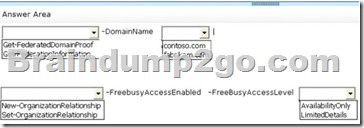
Answer:
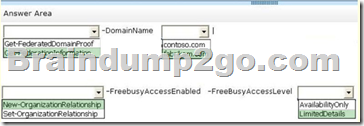
Explanation:
There is no Organization Relationship indicated, only a trust relationship.
Hence, the command should be New-OrganizationRelationship, not Set-Relationship.
Also, the Organization Relationship is created from the domain that wants to do the sharing, so this command is run on Contoso and you would have -DomainName fabrikam.com since that’s the domain you are wanting to share to.
http://technet.microsoft.com/en-us/library/dd351221(v=exchg.150).aspx
The Get-FederationInformation cmdlet retrieves federation information from the domain specified. Results from the cmdlet can be piped to the New-OrganizationRelationship cmdlet to establish an organization relationship with the Exchange organization being queried.
http://technet.microsoft.com/en-us/library/dd351221(v=exchg.150).aspx
An organization relationship enables users in your Exchange organization to share calendar free/busy information as part of federated sharing with other federated Exchange organizations. Federated sharing can be configured between two federated Exchange 2013 organizations or between a federated Exchange 2013 organization and federated Exchange 2010 organizations.
The organization relationship to be created is on Contoso.com, because you create the Organization Relationship on the domain you are sharing from. Hence, you want to get the Federation Information for fabrikam.com.
http://technet.microsoft.com/en-us/library/dd351221%28v=exchg.150%29.aspx
http://technet.microsoft.com/en-us/library/ee332357%28v=exchg.150%29.aspx
The FreeBusyAccessLevel parameter specifies the maximum amount of detail returned to the requesting organization.
You can use the following values:
None No free/busy access
AvailabilityOnly Free/busy access with time only
LimitedDetails Free/busy access with time, subject, and location
Case Study 1: A.Datum (QUESTION 10 ~ QUESTION 19)
Overview
General Overview
A. Datum Corporation is a pet supply company that has stores across North America.
A. Datum has an Exchange Server 2007 organization. A. Datum plans to migrate to Exchange Server 2013.
Physical Locations
A. Datum has five locations. The locations are configured as shown in the following table.
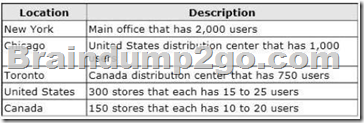
Existing Environment
Network Infrastructure
All of the locations connect to the each other by using a WAN link. The New York, Toronto, and Chicago locations connect directly to the Internet.
All client computers run Windows 7 and Office 2010. All servers run Windows Server 2008.
Active Directory Environment
The network contains an Active Directory domain named adatum.local. Adatum.local is the corporate domain based in the United States. The network contains a domain named Canada.adatum.local. Canada.adatum.local is the domain for the stores in Canada.
Each location is configured as an Active Directory site.
The forest functional level is Windows Server 2008.
The main office and both of the distribution centers each has two domain controllers for their respective domain. All of the other locations have one domain controller for their respective domain. All of the domain controllers are global catalog servers.
Exchange Infrastructure
The main office and the distribution centers each have three servers that have Exchange Server 2007 installed.
The servers have the following configurations:
– Two of the servers have cluster continuous replication (CCR) deployed
– One of the servers has the Client Access server role and the Hub Transport server role installed
Each store contains a server that has Exchange Server 2007 installed. Each server has mailboxes for active users and mailboxes for inactive users. Each server has approximately 50 mailboxes. Remote users access Outlook Web Access by using a namespace of mail.adatum.com, which resolves to the Client Access server in the New York office.
Requirements
Planned Changes
The company plans to implement the following changes:
– Migrate all of the mailboxes in the main office and the distribution centers to Exchange Server 2013.
– Integrate a new telephone system to the Exchange Server 2013 organization.
– Deploy a standalone certification authority (CA) that will be used to issue all of the certificates for the messaging infrastructure.
Technical Requirements
The company identifies the following technical requirements:
– Hardware costs must be minimized whenever possible.
– The impact on end users if a site fails must be minimized.
– Voice mail traffic between the telephone system and the Exchange Server environment must be encrypted.
– Each user must be able to access the internal resources and their mailbox by using a single user account.
Compliance Requirements
After a security review, the company identifies the following compliance requirements for the new Exchange Server environment:
– All administrative changes made to the mailboxes must be tracked.
– The legal department must be able to search for messages in all of the mailboxes.
– Users must be prevented from sending email during an upcoming statutory holiday.
– All store managers must be prevented from permanently deleting email messages from their Inbox.
– All email messages must be archived for a minimum of five years to meet regulatory requirements.
– Management occasionally sends the staff internal memos that contain confidential information, such as sales figures. The memos must be protected so that unauthorized users cannot read the memos and internal users cannot forward the memos to external recipients.
– The users in the research department must be able to send email to anyone in the organization, but only the members of a group named Execs must be able to send email to the research users. All other users must be notified that email sent to the research users will remain undelivered.
QUESTION
You need to recommend a solution for the memos.
The solution must meet the compliance requirements.
What should you include in the recommendation?
A. Secure/Multipurpose Internet Mail Extensions (S/MIME)
B. Information Rights Management (IRM)
C. Domain Security
D. Data loss prevention (DLP) policies
Answer: B
Explanation:
* Scenario:
Management occasionally sends the staff internal memos that contain confidential information, such as sales figures. The memos must be protected so that unauthorized users cannot read the memos and internal users cannot forward the memos to external recipients.
* With the IRM features in Exchange 2013, your organization and your users can control the rights recipients have for e-mail. IRM also helps allow or restrict recipient actions such as forwarding a message to other recipients, printing a message or attachment, or extracting message or attachment content by copying and pasting. IRM protection can be applied by users in Microsoft Outlook or Microsoft Office Outlook Web App, or it can be based on your organization’s messaging policies and applied using transport protection rules or Outlook protection rules.
IRM also helps allow or restrict recipient actions such as forwarding a message to other recipients, printing a message or attachment, or extracting message or attachment content by copying and pasting.
http://technet.microsoft.com/en-us/library/dd638140%28v=exchg.150%29.aspx
2016 New Microsoft 70-342 Preparation Materials:
1.Microsoft 70-342 New Questions and Answers 231q, 100% Pass 70-342 Exam Guaranteed! http://www.braindump2go.com/70-342.html
2.Microsoft 70-342 Dumps PDF from Google Drive — Google.com
